 Getty Images
Getty Images
Baby Reindeer, the hugely popular but highly contentious British TV hit, has taken the Emmy Awards by storm, winning four trophies at the ceremony in Los Angeles.
The show’s creator and star, Scottish comedian Richard Gadd, won three of those – for acting in, writing and executive producing the show.
His co-star Jessica Gunning, who played stalker Martha, was named best supporting actress in a limited series.
“Oh my goodness me, blinking heckers,” she said on accepting the award.
“Thank you so much. I honestly feel like I’m going to wake up any minute now and this whole thing has been a dream.”
Gadd’s account of being stalked by a woman for several years and being sexually abused by a male TV industry figure, has been the most talked about show of the year.
However, its claim to be “a true story” has made it controversial, and the real-life woman who allegedly inspired Gunning’s character is currently suing Netflix for defamation, negligence and privacy violations.
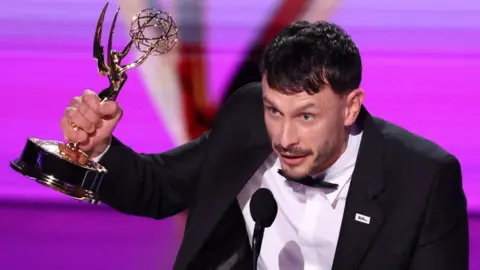 Reuters
Reuters
Accepting his award for best writing writing for a limited series, Gadd told the audience: “Ten years ago, I was down and out.
“I never ever thought I’d get my life together. I never ever thought I’d be able to rectify myself for what happened to me and get myself back on my feet again.
“And then here I am, just over a decade later, picking up one of the biggest writing awards in television.
“I don’t mean that to sound arrogant. I mean it as encouragement for anyone who’s going through a difficult time right now to persevere.”
Hacks has the last laugh
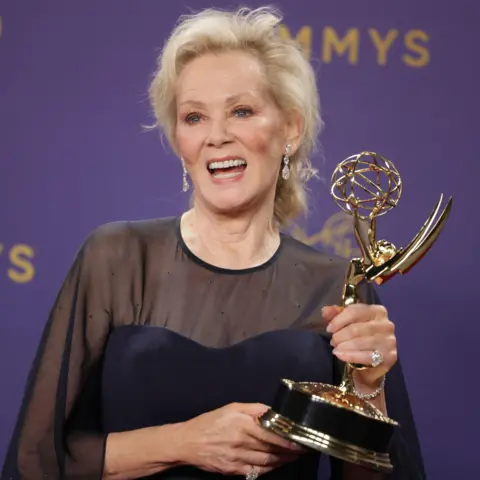 Reuters
Reuters
In the comedy categories, The Bear won three acting awards including best comedy actor for Jeremy Allen White, who plays Carmy, for the second year in a row.
Ebon Moss-Bachrach (Richie) and Liza Colon-Zayas (Tina) took the supporting awards, the latter appearing overwhelmed to have beaten legends like Meryl Streep and Carol Burnett.
“To all the Latinas who are looking at me, keep believing, and vote – vote for your rights,” she said in her acceptance speech.
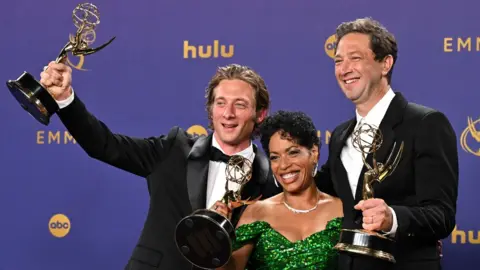 Getty Images
Getty Images
The show, set in a highly pressured restaurant kitchen, once again raised eyebrows for being nominated in the comedy section instead of drama.
Perhaps that, combined with a lukewarm reception for its latest season, explains why The Bear lost the award for best comedy series, in the night’s biggest shock.
Instead, that prize went to Hacks, which follows the love-hate relationship between a veteran comedian and her younger writer.
And Hacks star Jean Smart won best comedy actress – her third Emmy win for playing Deborah in the show and her sixth career Emmy overall – ahead of The Bear’s Ayo Edebiri (Sydney), who took the prize last year.
Debicki’s Princess Diana reigns
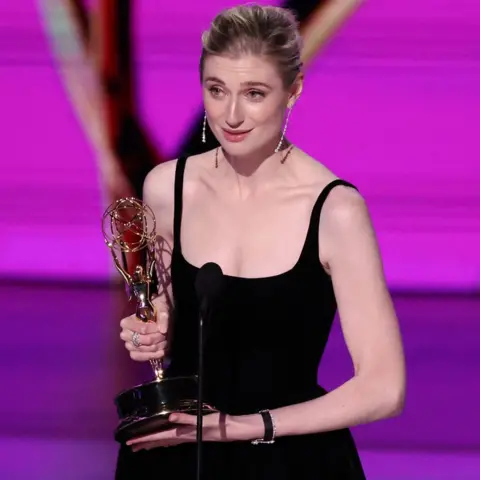 Reuters
Reuters
In the drama categories, Australia’s Elizabeth Debicki won her first Emmy, best drama actress for playing Princess Diana in the final season of Netflix’s The Crown.
“Playing this part based on this unparallelled, incredible human being has been my great privilege and it’s been a gift,” she said.
However, hers was the only victory for The Crown’s swansong, and the other drama categories were dominated by Japanese historical epic Shogun.
The show had already broken the record for the most Emmy wins in a single year after picking up 14 prizes at last weekend’s Creative Arts Emmys, mainly for achievements behind the scenes.
It added another four trophies at the main event, including best drama series – the first non-English language show to take that prestigious prize.
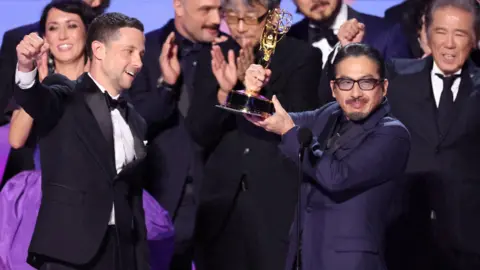 Reuters
Reuters
There were also lead drama acting awards for Japanese cast members Hiroyuki Sanada (Yoshii Toranaga) and Anna Sawai (Toda Mariko).
Elsewhere, Billy Crudup won best supporting drama actor for The Morning Show, while Jodie Foster won best actress in a limited series for True Detective: Night Country.
Successful British talent included TV host John Oliver, who won best scripted variety series, and Will Smith, who won best drama writing for Slow Horses.
The Traitors host Alan Cumming picked up the programme’s trophy for best reality or competition show. That came after he was named best reality or competition host at the Creative Arts Emmys, which took place a week before the main ceremony.
